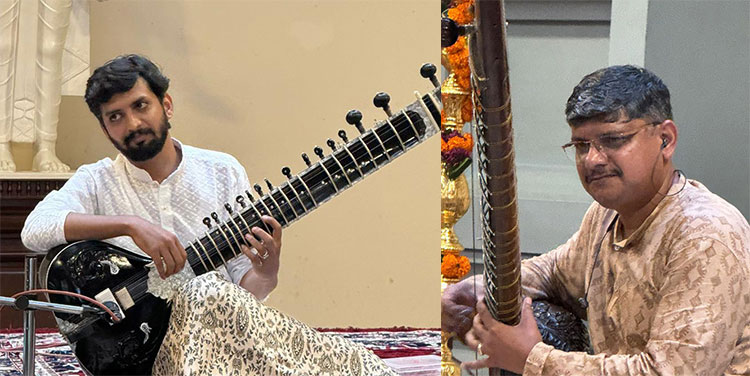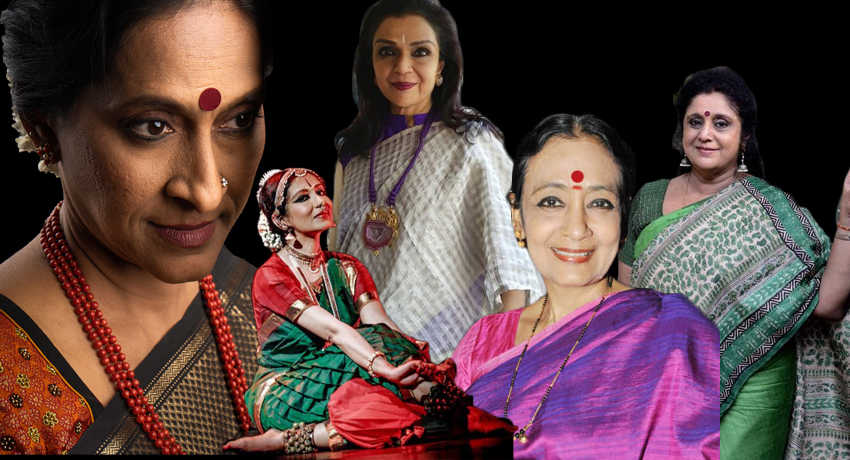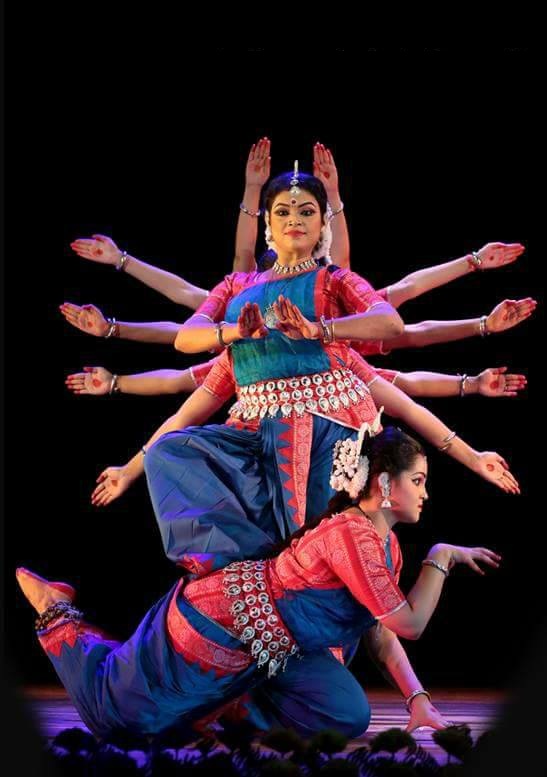The followers and admirers of the Late Ustad Vilayat Khan and his dedicated disciple Pt Arvind Parikh gathered at the Geeta Bhavan Hall of Bharatiya Vidya Bhavan, Mumbai, for the Guru Purnima Utsav, when Pt. Arvind Parikh, offered a bouquet of performances by his disciples and the students of his disciples, as a tribute to his Guru, the Late Ud Vilayat Khan. There could be no better way to redeem the debt of a Guru, (the ‘Guru-Rina’), than carrying forward the knowledge and values received from one’s Guru, teaching it to the generations next.
A staunch believer in the Gharana Parampara, the traditional way of transmitting the ‘Guru-Mukhi Vidya’ like classical Hindustani music, through Guru-Shishya Parampara; Pt Arvind Parikh has been carrying forward the legacy of his Gharana with missionary zeal. The Guru-Purnima Festival organised on the auspicious occasion of Guru Purnima, symbolises the same by spreading the fragrance of his Gharana.
Our treaties have given five criteria to define a Guru, namely Gyan – knowledge, Vigyan – scientific, analytical approach, Vachan – the ability to articulate clearly, Prayog-Siddhi – the ability to demonstrate what he wants to teach and ‘Shishya-Nishpadan-Kshamata’, the commitment to mentor the disciple into an artiste. Pt. Arvind Parikh, the Padma Bhushan Awardee, Akademi-Ratna, Fellow of Sangeet Natak Akademi, and the senior most disciple of Ustad Vilayat Khan, excels in all these with utmost sincerity and commitment.
Being Khan Saheb’s senior-most Ganda-Bandh ‘Shagird’, the earnest disciple (through tieing of the sacred thread), for decades on end, Arvind Bhai (as fondly addressed by the musical fraternity) is one of the principal inheritors of the Vilayatkhani Baaj (style). He has painstakingly carried forward the glorious legacy of his Gharana with meticulous teaching. Besides practical training, he has recorded a wealth of musical materials, available as digital recordings uploaded on the mobiles of his disciples for ready reference. He has also created a website with detailed information about hundreds of Ragas, their varieties (Raag-Prakar), compositions and much more.
The bonhomie in the Vilayatkhani Parivar cultivated by Arvind Bhai is a rare sight in the present-day musical scenario where jealousy is the norm. On the eve of the two-day Guru Purnima Utsav, for instance, a get-together of his disciples at his home one saw the 97-year-old Guru gifting his numerous awards amongst his students through lucky-dip of their name chits before the delicious refreshments were served. Each morning he spends nearly two hours listening to the recordings sent by his students who can’t reach him in person. He makes notes about the areas for improvement to discuss in their ‘Talim’ sessions on Zoom. Addressing the students this evening he said “Ud. Vilayat Khan was a divine soul. I want his Parampara (legacy) to live long and would like all of you to be together in this endeavour. This is my message on Guru-Purnima.”
The two-day festival opened with a welcome address by his senior disciple Dr Suvarnalata Rao, (the program head of Music at the NCPA) who talked about the five qualities of a Guru that so aptly describe Guru Arvind Parikh, about his documenting enormous material from Sitar technique to Alap elaboration, his poems on Raag-Prakars, about the four hundred Gat composed by him in hundred ragas, his books like ‘The Glorious Tradition of Etawah-Imdadkhani Gharana’ to ‘The Training Manual for Teachers’, and the compositions he got from Devadhar Saheb to his latest endeavour to produce small booklets on the creative impact of great maestros of Hindustani music.
The two-day event showcasing nearly 33 students performing Vocal, Shehnai, Surbahar, Guitar and Sitar recitals opened with video recordings of the grand disciples of Pt. Arvind Parikh. Radhika Vedulkar for instance was the student of Narendra Bhosle and Varad Bhosle both disciples of Pt. Arvind Parikh. Radhika played raga Yaman quite confidently with Alap followed by a Vilambit Gat of the Late Ud. Imdad Khan and the Drut composition of Pt. Arvind Parikh with a difficult Mukhda studded with Taans. Likewise, Jessika Budh was a student of Amrita Kulkarni, Megh Bapat a student of Bhupal Panshikar, who played the famous bandish of Bageshri “Apni garaj pakad linhi bainyaan…”, all were disciple of Pt. Arvind Parikh. Mihika was the great-grand disciple who learnt from Antara, a student of Gopak Krishna in turn a disciple of Pt. Arvind Parikh.

Some of the vocal and instrumental concerts on both days were par excellence, most of them were above average and some needed more practice. Bairagi Bharav on Shehenai by Kiran Shinde vouched for his musical family background and proper guidance under the tutelage of Pt. Arvind Parikh. The detailed delineation of raga Malkauns on Sitar by Gopal Krishna Shah, a music lecturer at the Delhi University, a Surbahar recital by Ashwin Dalvi playing detailed Aalap-Jod-Jhala in raga Miyan Malhar, raga Jhinjhoti on Sitar played by Bhupal Panshikar and Varad Bhosle, the vocal recital of Purvi Parikh, daughter and disciple of late Smt Kishori Parikh and Pt. Arvind Parikh, a ‘Gandabandh’ disciple of Ud. Vilayat Khan and Vidushi Girija Devi, singing the choicest Bandishes in raga Shankara and a Kajri, the vocal rendition of Marwa by Supriyo Dutta, Puriya by Amruta More on Sitar, Desh by Amrita Kulkarni, Bihag on Guitar by Prathamesh Pareek, and Madhuwanti by Rafat Khan were some of the remarkable performances noted for proper ‘Silsila’ (progression) of the raga.
Vocal recital by Jaspal Singh Kalsi from Punjab, Sitar recital by Nishad Mistry from Vadodara Gujrat, Maruti Patil from Pune, Altaf Khan from Jaipur who played the romantic raga Pilu, as flamboyant as his red colour Zeetar. Nitin Parmar from Vadodara Gujrat, Vandana Shahani from Mumbai, Sundar Nath from Nashik, Paresh Parekh from Surat, Sushma Jhaveri from Mumbai, Jyoti Shyam from Bangaluru, Madhura Karambelkar from Mumbai, Varsha Sohle from Nagpur, and Harpreet Singh from Punjab were the other disciples who performed.
The video recordings of the grand disciples on the second day comprised Jayendra Harshe, a student of Amruta More playing Yaman on Sitar, a Sitar duet of raga Yaman with three difficult compositions of Pt. Arvind Parikh studded with Taans played well by Gautham Krishna and Gagan Krishna students of Rajiv Janardan from Kerala, raga Kedar by Galen Passen a student of Gopal Krishna Shah from Brooklyn NYC, and Nathalie Esselin a student of Ashwin Dalvi from the UK, who played a melodious Bhairavi.

There were also video recordings of his disciples from foreign lands disseminating Hindustani music. Premal Bhana from South Africa played raga Khamaj, James Pusey from the UK played raga Bhimpalasi, Alan Posselt from Australia rendered raga Miyan Malhar, Abhik Mukherjee from New York City enchanted with raga Tilak Kamod, and Supriyo Dutta’s vocal recital of the serene raga Marwa was noteworthy.
Pt. Arvind Parikh expressed his happiness to see his student’s students playing in such ‘Sur’ and ‘Laya’ with the correct disposition of both hands. He also mentioned that during his 90 years in music, he has not seen anybody teaching the theory or the structural approach in practice (which was followed here). Guru Purnima is an event when all my students come together. It’s satisfying to see that not just my disciples but their students are also participating this year. I bless them all.








